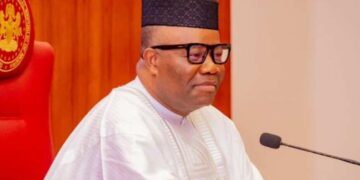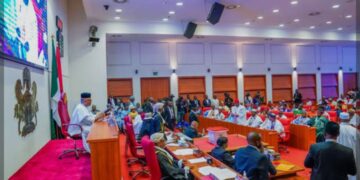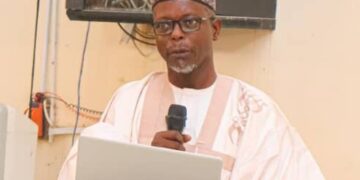By John Adamu, Abuja
The Senate on Thursday approved the last two pieces of legislation in President Bola Tinubu’s tax reform package, completing its work on the landmark economic bills.
The upper legislative chamber will now enter reconciliation talks with the House of Representatives to align their respective versions before final presidential assent.
Lawmakers gave their final approval to the Joint Revenue Board (Establishment) Bill, 2025 and the Nigeria Tax Bill, 2025 during Thursday’s plenary session.
These join two other tax-related bills passed on Wednesday – the Nigeria Tax Administration Bill, 2025 and the Nigeria Revenue Service Bill, 2025 – completing the four-bill package first submitted to the National Assembly in November 2024.
Senate Majority Leader Opeyemi Bamidele highlighted the extensive legislative process behind the bills, revealing that senators held 39 separate stakeholder engagements to refine the proposals.
The bills initially faced significant controversy, but lawmakers resolved key differences through multiple rounds of consultations. With both chambers having now passed their versions, a conference committee comprising senators and representatives will meet to reconcile any remaining discrepancies before presenting the final legislation to President Tinubu.
The tax reform package represents a central plank of the administration’s economic strategy, aiming to modernise Nigeria’s revenue collection system and improve fiscal management.
The Senate Leader disclosed that after rigorous scrutiny and 39 stakeholder engagements, lawmakers finalised the landmark tax reforms, insisting they acted in the best interest of the people of Nigeria.
He said: “Thirty-nine different engagements were held on these bills from across various sectors.
“It was meant to give thoroughness to the bills and bring out the best to serve the nation.
“We are not here to grandstand or to portray ourselves as a rubber stamp parliament.”
The proposed tax reform legislation is expected to improve coordination and standardisation of tax collection across all levels of government – federal, state and local authorities.
Additionally, it provides for a dedicated Tax Appeals Tribunal to handle taxation disputes, taking over these responsibilities from the Federal Inland Revenue Service (FIRS) framework.
A key innovation in the bill is the introduction of a Tax Ombudsman’s office, designed to safeguard taxpayer rights and promote transparent, equitable tax practices.
The reforms are intended to modernise tax governance by enhancing collaboration between different government tiers while implementing improved conflict resolution processes, ultimately establishing a more balanced and predictable taxation system.
In addition, the bill “supports collaboration between federal and subnational tax authorities, including assistance by the Nigeria Revenue Service (NRS) to states and local governments in tax collection where legally authorised.”
The second bill, Nigeria Tax Bill, 2025, makes several provisions like reduction of company income tax (CIT) rate from 30% to 27.5% in 2025 and further to 25% in subsequent years.
There is the provision for exemption of small businesses with annual turnover of ₦50 million or less from income tax and withholding tax on business income, including payments to vendors.
Furthermore, personal income tax exemption for workers earning N800,000 annually and below, with a progressive tax rate structure for higher incomes up to 25% for incomes above N50 million, among others.









































Discussion about this post